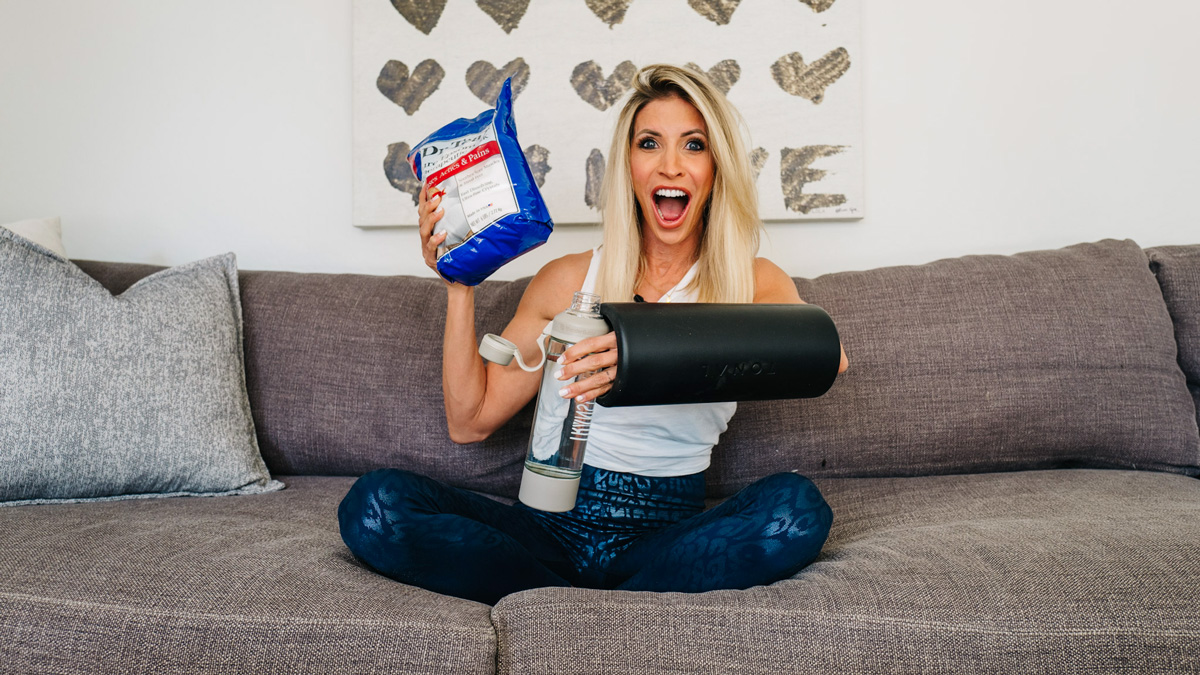You guys, there’s a question I keep getting time and time again, so I figured, HEY. If people keep asking, it must be pretty dang important, right? And if inquiring minds want to know, I should probably share this answer as a blog post too.
Should I feel sore after every workout? It’s a fair question. Is it possible to get in a great workout even if you’re not sore the next day? The answer? YES!
Don’t feel like reading on? Watch the video above!
What does post-workout soreness even mean?
We are trained to associate a good workout with soreness, and I am even guilty of finding myself leaning into this myth. When we exercise, our muscles get broken down, and lactic acid is released, causing a fluid build up the next day. This results, a lot of times, in soreness. But it doesn’t necessarily mean that you have to be sore in order to have gotten in a good workout.
There are so many other thing that are happening when we exercise that can improve our body’s total fitness. If you’re not sore, it doesn’t mean you didn’t “do anything.” BUT, one thing to keep in mind is that while you don’t have to feel sore all the time, you should be feeling some soreness every so often, and if you’re not, that could be a sign that it’s time to push yourself just a little bit harder.
Is it possible to be too sore?
Again, YES!
And I don’t say this to scare anyone, but if you’re someone who feels like you have something to prove when you step into that gym or you get caught up in an imaginary competition (hey, I’m talking to myself here too, guys), then this is something you’ll need to keep an eye on.
I learned this lesson the hard way years ago. I was working out with Derek, and I could my muscles getting hot. What I didn’t realize at the time was that my muscles were inflamed, and that heat was a sign I needed to stop. The end result? I tore my brachioradialis because I wasn’t listening to my body.
There’s definitely a difference between soreness and pain, and if your soreness is ever accompanied by bruising, swelling, or redness, that’s not a good sign, and it’s an indicator that you’re pushing yourself too hard and you need to back off.
But since we’re talking about soreness, keep in mind that it’s normal. You’re going to feel it. Especially if working out is newer to you, or you’ve started a new routine, or even if you’re a former athlete and you’ve taken time off. Getting back into the groove of consistent movement will make you sore. It’s a sign that there’s new stimulus to your body, your muscles are successfully breaking down (so they can be built back up), lactic acid is flowing, and fluid is rushing to the areas of damage to help repair what’s going on. You’ll feel that.
What can I do for soreness?
Honestly? The best thing you can do when you’re feeling sore is to keep moving! It’s probably the last thing you often want to do, right? Who wants to wake up in the morning after a day of squats and go exercise again? Don’t do more squats if you’re sore, but move your body in a way that’s lighter.
Why? Because your lymphatic system needs to drain all those fluids, and the best way for your body to detox and make that happen is to get up and get moving. Go for a walk, stretch, swim, do light weights—something simple to assist your body in flushing those fluids. Be sure to not doing anything that’s heavy, which can damage the muscle.
Here’s another thing, and this one is big, guys! Make sure you’re staying hydrated. It may seem counterproductive, but the best way to flush fluid from the body is to drink more fluids (aka water).
Learn more about the importance of hydration here.
Two more soreness and workout tips:
- Make sure you’re warming up properly before a workout and stretching/cooling down after a workout to help minimize any soreness that may follow. Doing so helps stimulate your muscles to fully engage and maximize the workout, and stretching afterwards will also help flush out those toxins that are building up. If you have a foam roller, use it! Even on your days off.
- Last tip? Take an Epsom salt bath! Incorporate it into your “me time” when you relax at the end of the day. You’ll give yourself time to unwind and destress while the Epsom salts pulls toxins from the body.
There you have it! An in-depth topic broken down into five minutes. I hope it’s helped! Don’t forget to share what other questions you have, and maybe they’ll make it into my next “Five Minute Friday” segment!
xo,
Related reading:
Stretch It Out: Why Stretching Is Important
10 Foam Rolling Exercises, Stretches, and Mobility Movements
Transform your daily routine: Take a walk
Myth Busting | Lifting Weights Makes You Bulky
How to Create a Workout in 4 Simple Steps



